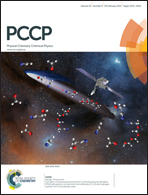Effects of the electric field on the properties of ZnO–graphene composites: a density functional theory study
Abstract
In this work, the effects of the electric field on the properties of ZnO–graphene composites were theoretically studied using density functional theory calculations. Three types of ZnO–graphene composites including composites of pristine graphene, graphene with defects as well as graphene oxide and a ZnO bilayer were studied. We calculated and analyzed the binding energies, charge transfer, band structures and work functions of the above composites under the external electric fields. The DFT calculation results demonstrate that the binding energies are sensitive to the electric field, and increasing the external electric field gives rise to stronger binding energies. The extent of charge transfer is correlated with the magnitude of the external electric field, but the band gaps are hardly affected by the external electric field. The work functions vary depending on the different structures of the composites and surface sides, and they are also tunable by the external electric field.


 Please wait while we load your content...
Please wait while we load your content...